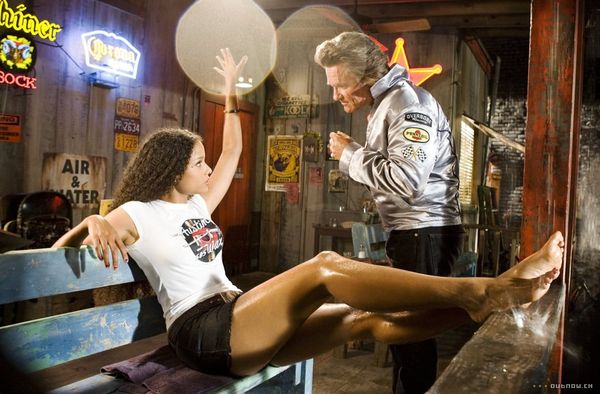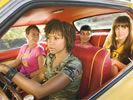Eye For Film >> Movies >> Death Proof (2007) Film Review

Quentin Tarantino's Death Proof is a magnificent tribute to the excesses of trash cinema. It's also his greatest film since Pulp Fiction, a sneaky and insidious little delight.
The plot, such as it is, is about a psycho - Stuntman Mike (Kurt Russell revelling in sheer all-American iconography) - who murders women using his two ton "death proof" muscle stuntcar. He strikes up a friendship with an attractive girl in a bar (Rose McGowan - Tarantino bathes her in virginal light which bloom), and charms her in a small but stunningly-written soliloquy to take a ride. Biggest mistake she'll ever make.

The film is a glorious collection of the trashy ideas in the go-for-broke exploitation flicks of the Seventies, known as the Grindhouse genre. By dressing the entirely modern movie with technical ineptitudes like enormous, screen-width scratches, nicks and print defects, dodgy jump-cuts, and slotting in a half reel in black and white simply because it looks so damn cool - it reinforces the notion that someone found this print under a pile of old crap in someone's basement and cobbled it together by themselves.
Sure, it's cheeky - the texting and iPods in a 70s exploitation throwback, juxtaposing Fangoria/Shock Cinema and Film Comment magazines in the same shelf in a grotty 7/11 - but by God, it's fun. Like all of his films, it doesn't quite send up the genre - rather, it takes the most interesting elements, elevates them and turns them into something that is never boring and has plenty to say.
It also boasts a very personal brand of feminism. Equal amounts of misogyny and misandrist story constructs are smeared about for those who will dig for it, but Tarantino is having a good old laugh at their expense while punishing the men of the picture equally - Eli Roth takes a cameo in attempting to charm the ladies. It's clever and entertaining highbrow and lowbrow stuff. The women that Tarantino loves are as at home kicking a whole lot of ass as looking delicious - an ironic and loving form of "girl power". Early on, Tarantino hammers home how cheesy and petty our little sex-rituals are, and devotes funny scripting to it.
The zesty and lively girls in the second half of the movie quickly snap from passive blind terror and enjoy their revenge with all the caved in skull-duggery it deserves. These powerful and strong women (two stuntwomen and Rosario Dawson, who is indentified as a mother, the bearer and deliverer of life, while Stuntman Mike takes life for masturbatory gratification) are wonderfully characterised people. The script is careful and smart enough to distinguish sexual politics and conquest and still create clever and light humour in the process - all the excess dialogue is character-building.
Death Proof celebrates the genre and meshes it perfectly with modern filmmaking technique and storytelling prowess. Not for nothing does the roar of Mike's rampant carnality - oh sorry, his "ride", complete with phallic duck affixed to the bonnet - sound so clear in digital sound. And like so much of Tarantino's prior work, Death Proof is dotted in knowing, kidding and loving references, yet all the while he makes every stolen shot, every re-envisioned cool piece of exposition entirely his own. He steals wholeheartedly, but we are never in doubt that it's Tarantino behind the creative wheel. Far from cut and paste, he's an auteur who instinctively knows why something's cool, and how best to deliver his story within the genre constraints.
It is also a celebration of filmmaking techniques, characterisation and storytelling prowess. The man simply knows how to write great dialogue which exudes character and is snappy. Stuntman Mike's little speech about "good in my book" is both hilarious, menacing, witty and strangely in-character with the rest of his established movie-loving dialogue, and delivered with relish. Every performer in the movie (Tarantino himself included as Warren the Bartender) looks like they're having a great time.
So was everyone else, the audience was roaring with laughter and squirming in delighted horror, often in the same moment. Indeed, Tarantino fully implicates and invites us to share these gruesome murders for what they are; Mike looks straight into the camera at one point just prior to the first - knowing full well that we're all going to stick around for the money shots.
I confess, I'm very fond of Tarantino's foot fetish. It's a humanising trait common to his features - which is also like his own choice to become director of photography in Death Proof. There really is an instinctive join between camera and actor, prompting the actors to give their best. The chumminess of performer and director is enthusiastic and fun. It is astonishingly well-acted, with a dialogue-laden script that reminds your reviewer just why Tarantino collected his Best Screenplay Oscar.
For all Kill Bill's deliciously effective action, the final 20 minutes of Death Proof tear all this up for a sterling piece of stunt-porn in which Tarantino amazes us with the abilities of his drivers, Kiwi stuntwoman (the rustic, charming Zoe Bell) and editor Sally Menke's cutting. It is the most astonishing driving set-piece I have seen since the mighty Ronin, perhaps even topping it for sheer "go for broke" verve.
Death Proof is as much an experience as it is a movie for those who love movies. See it in a cinema and not on DVD. Don't let it tank like it did over the pond as part of "Grindhouse".
Reviewed on: 22 Aug 2007


















